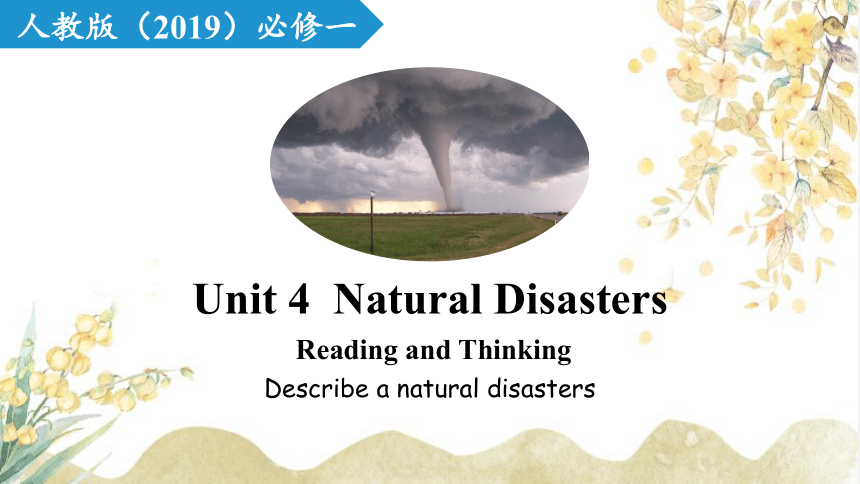(
课件网) 人教版(2019)必修一 Unit 4 Natural Disasters Reading and Thinking Describe a natural disasters Learning objectives By the end of this section, you will be able to: 1. predict the main idea of the text based on the title and a photo; 2. summarize the main idea of each paragraph of the passage during reading; 3. use context to understand new words during reading and apply them to complete some sentences; 4. grasp the features of a literary journalism, such as narrative structure, language after reading; 5. understand the theme of the text through answering some questions; 6. reflect on the lessons that we can learn from the earthquake. Lead-in Discuss what can happen to a city during a big earthquake. A city can be damaged in an earthquake. The electricity can go down. The water can be unsafe to drink. Fires can start. People can panic or get severely injured. Pre-reading Look at the title and photo below and guess what the text is about. Then read and check if you are right. THE NIGHT THE EARTH DIDN’T SLEEP Maybe something terrible happened. Maybe they wanted to rescue somebody under the collapsed buildings. The earthquake that happened at night caused great damage to the city and people. While-reading Read the text carefully and then write down the main idea of each paragraph. Paragraph 1: _____ Paragraph 2: _____ Paragraph 3: _____ Paragraph 4: _____ Paragraph 5: _____ Warning signs before the earthquake. The happening of the big earthquake. The immediate effects of the earthquake. The rescue work. The revival of the city. Scan the text and find the words below. Guess what they mean from the context. Use context to understand new words When you see a word you do not know, do not stop and look it up in a dictionary. If you continue reading, the context will probably help you understand what it means. ruin brick trap bury ruin (noun, Paragraph 2) This word describes the city straight after the earthquake. In a short time, a lot of damage was done, so it must describe a place that has been badly damaged. brick (noun, Paragraph 3) This word is used to describe the buildings that have fallen. They are red like leaves, but also heavy, because the wind cannot move them. They sound like the red clay blocks commonly used to build buildings. trap (verb, Paragraph 4) This verb is used to describe people who are not dead, but they need help to be dug out, so it must mean they cannot move because they are stuck somewhere. bury (verb, Paragraph 4) This verb is used to describe what happens to the dead bodies. They are often put into the ground and covered, so that could be what this means. Read paragraph 1 and answer the following questions. 1. What were some of the strange things that were happening before the earthquake Before the earthquake, the water in the village wells rose and fell. Deep cracks appeared in their walls. Animals were acting strangely. 2. Do you think they were warning sig ... ...

